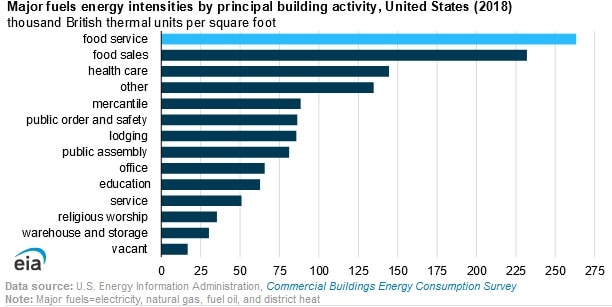U.S. Food Service Buildings Four Times More Energy Intensive Than Commercial Buildings: EIA

Food service buildings encompassing restaurants across the U.S. are on average almost four times more energy intensive than commercial buildings, according to an Aug. 28 report from the U.S. Energy Information Administration. The agency determines energy intensity for each building category by dividing total usage of key energy fuels, such as electricity, fuel oil and natural gas by the total floorspace.
The recently published 2018 Commercial Buildings Energy Consumption Survey reported that food service structures used 365 trillion British thermal units and on average used 263 thousand British thermal units per square foot (MBtu/sf) compared to 70 MBtu/sf for the average commercial building.
The agency has three subclasses of food service structures: restaurant or cafeterias, fast food and other food service outlets, consisting of bars, pubs, and coffee shops, among others. Restaurants and cafeterias were the largest food service building category, comprising 61 percent of all food service buildings. In terms of floorspace, around 66 percent of food service structures were between 1,001 square feet and 5,000 square feet. Moreover, food service structures were the smallest commercial constructions, averaging 4,800 square feet per building.
Despite food service buildings accounting for one percent of the total commercial floor space, these buildings made up for more than five percent of energy utilisation in commercial buildings, with electricity the highest utilised fuel, tailed by natural gas. Furthermore, food service buildings had the highest natural gas intensity, recorded at 147.6 cubic feet per square foot. On average, this was four times higher than the intensity for all commercial structures.
In terms of end use, food service buildings used significantly more energy for cooking (40 percent), followed by refrigeration (15 percent) and space heating (12 percent).
EnerKnol Pulses like this one are powered by the EnerKnol Platform—the first comprehensive database for real-time energy policy tracking. Sign up for a free trial below for access to key regulatory data and deep industry insights across the energy spectrum.
ACCESS FREE TRIAL